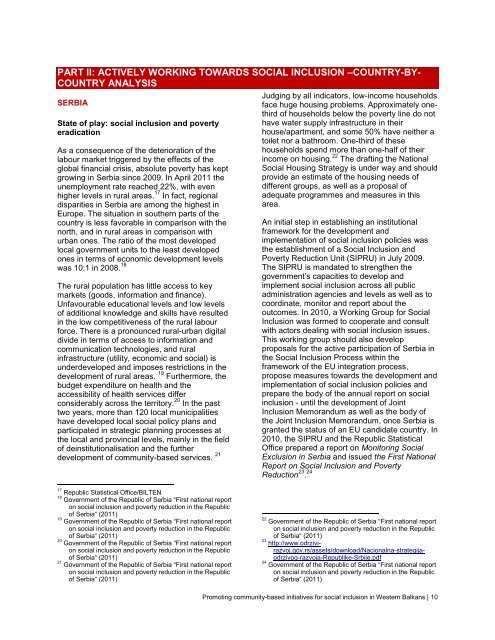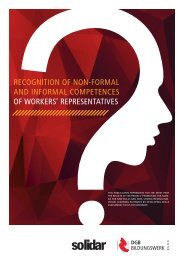Promoting community-based initiatives for social inclusion ... - Solidar
Promoting community-based initiatives for social inclusion ... - Solidar
Promoting community-based initiatives for social inclusion ... - Solidar
Create successful ePaper yourself
Turn your PDF publications into a flip-book with our unique Google optimized e-Paper software.
PART II: ACTIVELY WORKING TOWARDS SOCIAL INCLUSION –COUNTRY-BY-<br />
COUNTRY ANALYSIS<br />
SERBIA<br />
State of play: <strong>social</strong> <strong>inclusion</strong> and poverty<br />
eradication<br />
As a consequence of the deterioration of the<br />
labour market triggered by the effects of the<br />
global financial crisis, absolute poverty has kept<br />
growing in Serbia since 2009. In April 2011 the<br />
unemployment rate reached 22%, with even<br />
higher levels in rural areas. 17 In fact, regional<br />
disparities in Serbia are among the highest in<br />
Europe. The situation in southern parts of the<br />
country is less favorable in comparison with the<br />
north, and in rural areas in comparison with<br />
urban ones. The ratio of the most developed<br />
local government units to the least developed<br />
ones in terms of economic development levels<br />
was 10:1 in 2008. 18<br />
The rural population has little access to key<br />
markets (goods, in<strong>for</strong>mation and finance).<br />
Unfavourable educational levels and low levels<br />
of additional knowledge and skills have resulted<br />
in the low competitiveness of the rural labour<br />
<strong>for</strong>ce. There is a pronounced rural-urban digital<br />
divide in terms of access to in<strong>for</strong>mation and<br />
communication technologies, and rural<br />
infrastructure (utility, economic and <strong>social</strong>) is<br />
underdeveloped and imposes restrictions in the<br />
development of rural areas. 19 Furthermore, the<br />
budget expenditure on health and the<br />
accessibility of health services differ<br />
considerably across the territory. 20 In the past<br />
two years, more than 120 local municipalities<br />
have developed local <strong>social</strong> policy plans and<br />
participated in strategic planning processes at<br />
the local and provincial levels, mainly in the field<br />
of deinstitutionalisation and the further<br />
development of <strong>community</strong>-<strong>based</strong> services. 21<br />
Judging by all indicators, low-income households<br />
face huge housing problems. Approximately onethird<br />
of households below the poverty line do not<br />
have water supply infrastructure in their<br />
house/apartment, and some 50% have neither a<br />
toilet nor a bathroom. One-third of these<br />
households spend more than one-half of their<br />
income on housing. 22 The drafting the National<br />
Social Housing Strategy is under way and should<br />
provide an estimate of the housing needs of<br />
different groups, as well as a proposal of<br />
adequate programmes and measures in this<br />
area.<br />
An initial step in establishing an institutional<br />
framework <strong>for</strong> the development and<br />
implementation of <strong>social</strong> <strong>inclusion</strong> policies was<br />
the establishment of a Social Inclusion and<br />
Poverty Reduction Unit (SIPRU) in July 2009.<br />
The SIPRU is mandated to strengthen the<br />
government‟s capacities to develop and<br />
implement <strong>social</strong> <strong>inclusion</strong> across all public<br />
administration agencies and levels as well as to<br />
coordinate, monitor and report about the<br />
outcomes. In 2010, a Working Group <strong>for</strong> Social<br />
Inclusion was <strong>for</strong>med to cooperate and consult<br />
with actors dealing with <strong>social</strong> <strong>inclusion</strong> issues.<br />
This working group should also develop<br />
proposals <strong>for</strong> the active participation of Serbia in<br />
the Social Inclusion Process within the<br />
framework of the EU integration process,<br />
propose measures towards the development and<br />
implementation of <strong>social</strong> <strong>inclusion</strong> policies and<br />
prepare the body of the annual report on <strong>social</strong><br />
<strong>inclusion</strong> - until the development of Joint<br />
Inclusion Memorandum as well as the body of<br />
the Joint Inclusion Memorandum, once Serbia is<br />
granted the status of an EU candidate country. In<br />
2010, the SIPRU and the Republic Statistical<br />
Office prepared a report on Monitoring Social<br />
Exclusion in Serbia and issued the First National<br />
Report on Social Inclusion and Poverty<br />
Reduction 23 . 24<br />
17 Republic Statistical Office/BILTEN<br />
18 Government of the Republic of Serbia “First national report<br />
on <strong>social</strong> <strong>inclusion</strong> and poverty reduction in the Republic<br />
of Serbia“ (2011)<br />
19 Government of the Republic of Serbia “First national report<br />
on <strong>social</strong> <strong>inclusion</strong> and poverty reduction in the Republic<br />
of Serbia“ (2011)<br />
20 Government of the Republic of Serbia “First national report<br />
on <strong>social</strong> <strong>inclusion</strong> and poverty reduction in the Republic<br />
of Serbia“ (2011)<br />
21 Government of the Republic of Serbia “First national report<br />
on <strong>social</strong> <strong>inclusion</strong> and poverty reduction in the Republic<br />
of Serbia“ (2011)<br />
22 Government of the Republic of Serbia “First national report<br />
on <strong>social</strong> <strong>inclusion</strong> and poverty reduction in the Republic<br />
of Serbia“ (2011)<br />
23 http://www.odrzivirazvoj.gov.rs/assets/download/Nacionalna-strategijaodrzivog-razvoja-Republike-Srbije.pdf<br />
24 Government of the Republic of Serbia “First national report<br />
on <strong>social</strong> <strong>inclusion</strong> and poverty reduction in the Republic<br />
of Serbia“ (2011)<br />
<strong>Promoting</strong> <strong>community</strong>-<strong>based</strong> <strong>initiatives</strong> <strong>for</strong> <strong>social</strong> <strong>inclusion</strong> in Western Balkans | 10
















